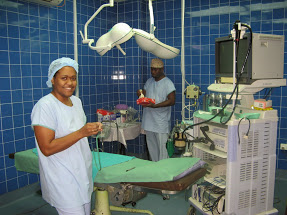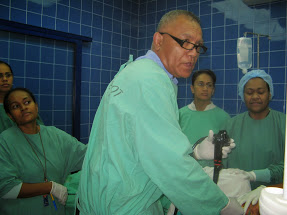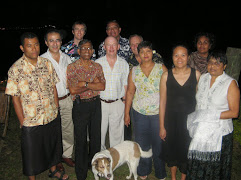Fiji Training Program
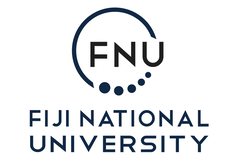
ANZGITA is the supporting partner in the World Gastroenterology Organisation's (WGO) Training Centre located in the Colonial War Memorial Hospital's (CWMH) Endoscopy Unit which operates in association with Fiji National University's (FNU) College of Medicine, Nursing & Health Sciences (CMNHS). The centre was established in 2008 when the first annual training program was conducted by ANZGITA. The centre trains physicians, surgeons and nurses from across the Pacific Island countries and territories during annual training programs. Attendees, in turn, have established services at their home hospitals. At CWMH, doctors diagnosed and treated over 1,000 patients in 2018/19 and ANZGITA, through the support of industry and other donors, provides donations of equipment and accessories to assist.
The lead Director of the Training Centre is Assoc Professor Jioji Malani, supported by Dr Mai Ling Perman with ANZGITA co-directors Prof Finlay Macrae and Assoc Prof Chris Hair, our Pacific Programs Leader in support. Read about Chris's passion for his work.
The lead Director of the Training Centre is Assoc Professor Jioji Malani, supported by Dr Mai Ling Perman with ANZGITA co-directors Prof Finlay Macrae and Assoc Prof Chris Hair, our Pacific Programs Leader in support. Read about Chris's passion for his work.
2022 Fiji Training Program
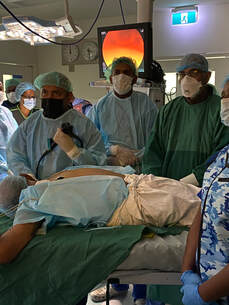
After the previous two programs were cancelled due to COVID, the 13th annual four-week training program was conducted in June. Due to the circumstances around funding availability there was a very tight timeframe for organising the program once the decision that the easing of the COVID pandemic made it feasible. The structure of the program was consistent with structure explained below under the Annual Training Programs heading.
Given the lack of training over recent years, the program was very popular amongst doctors, perhaps too popular as the number of trainees stressed the training hands-on opportunities given the available time. There were 13 physician/surgeon trainees, 3 registrars and 14 nurses (normally up to 10 each of doctors and nurses). What demonstrates the demand for training even more is that these trainees were mainly from Fiji hospitals as a number of countries had still not opened their borders. Postgraduate students in internal medicine at FNU as well as established clinicians attended.
Unfortunately when COVID was caught by a number of trainees and two trainers, the program had to be truncated to 3 weeks. Nevertheless, there was agreement that the program accomplished much in its aims of skill transfer. Some unfinished training was able to be conducted virtually in the following weeks.
Thanks to the trainers who responded to our call for volunteers at short notice. A team of 5 doctors and 5 nurses were assigned to the program. One trainer had to withdraw less than 48 hours before travelling due to contracting COVID. The training faculty from Australia (7) and New Zealand (3) was:
Given the lack of training over recent years, the program was very popular amongst doctors, perhaps too popular as the number of trainees stressed the training hands-on opportunities given the available time. There were 13 physician/surgeon trainees, 3 registrars and 14 nurses (normally up to 10 each of doctors and nurses). What demonstrates the demand for training even more is that these trainees were mainly from Fiji hospitals as a number of countries had still not opened their borders. Postgraduate students in internal medicine at FNU as well as established clinicians attended.
Unfortunately when COVID was caught by a number of trainees and two trainers, the program had to be truncated to 3 weeks. Nevertheless, there was agreement that the program accomplished much in its aims of skill transfer. Some unfinished training was able to be conducted virtually in the following weeks.
Thanks to the trainers who responded to our call for volunteers at short notice. A team of 5 doctors and 5 nurses were assigned to the program. One trainer had to withdraw less than 48 hours before travelling due to contracting COVID. The training faculty from Australia (7) and New Zealand (3) was:
|
Nurses
Dianne Jones Karenza Heath (withdrew) Natasha Rutland Karen Kempin Helen Van Loenen |
Doctors
Robyn Nagel Dinesh Lal Lybbie Hillman Terry Gavaghan Kumanan Nalankilli |
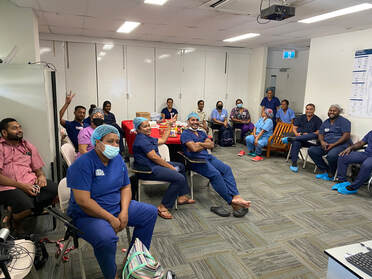 Training Presentation Underway
Training Presentation Underway
The doctor trainers average experience was 29 years and the nurses 22 years. There was a good range of experience in both, ranging between 10 and over 40 years. For three trainers it was their first program and for four their first time to Fiji, which is important for bringing 'new blood' into our trainers ranks. For four trainers it was it represented somewhere between their second and fifth program across all our partners. For Terry Gavaghan, it was his fifth Fiji program. For Karen Kempin, it was her seventh across all program partners and for Dianne Jones, who is an ANZGITA director, her twelth. So, as we generally try to do, it was a good mix of new and experienced.
There was also an observer - Dr Leshni Pillay. Dr Pillay is a trainee gastroenterologist with a strong interest in Fiji and attended for much of the last 10 days. She was interested in investigating how she and others at a similar stage of their careers can assist in the development of Pacific gastroenterology services at this time and as their own careers continue to develop. Leshni assisted the team and delivered presentations on topics she has been researching as part of her training. These were well received by trainers and trainees.
Dr Bruce Waxman, ANZGITA's newly appointed Surgical Coordinator, had also hoped to attend towards the end of program with a focus on how surgeons can best benefit from program involvement. However, his visit had to be cancelled.
Our thanks to RACS Global Health in responding quickly to our request and managing the process whereby we were allocated PIP funds to cover the expenses of our trainers. The PIP activities are funded by the Department of Foreign Affairs and Trade (DFAT) of the Australian Government.
In setting up this program, our thanks to Dr Shrish Acharya, Head of Medicine at CWM Hospital and the team at the at Fiji National University - Assoc Prof Jioji Malani, Assistant Prof Mai Ling Perman, Dr Vikash Sharma and Dr Aminiasi Rokocakau.
There was also an observer - Dr Leshni Pillay. Dr Pillay is a trainee gastroenterologist with a strong interest in Fiji and attended for much of the last 10 days. She was interested in investigating how she and others at a similar stage of their careers can assist in the development of Pacific gastroenterology services at this time and as their own careers continue to develop. Leshni assisted the team and delivered presentations on topics she has been researching as part of her training. These were well received by trainers and trainees.
Dr Bruce Waxman, ANZGITA's newly appointed Surgical Coordinator, had also hoped to attend towards the end of program with a focus on how surgeons can best benefit from program involvement. However, his visit had to be cancelled.
Our thanks to RACS Global Health in responding quickly to our request and managing the process whereby we were allocated PIP funds to cover the expenses of our trainers. The PIP activities are funded by the Department of Foreign Affairs and Trade (DFAT) of the Australian Government.
In setting up this program, our thanks to Dr Shrish Acharya, Head of Medicine at CWM Hospital and the team at the at Fiji National University - Assoc Prof Jioji Malani, Assistant Prof Mai Ling Perman, Dr Vikash Sharma and Dr Aminiasi Rokocakau.
Annual Training Programs
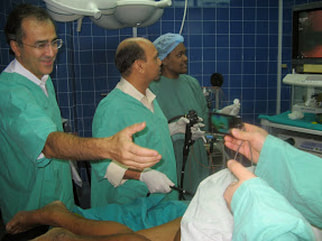 Dr. Peter Katelaris (left) engaged in training at WGO Training Centre at CWMH/FNU
Dr. Peter Katelaris (left) engaged in training at WGO Training Centre at CWMH/FNU
A 4 week period of concentrated training is held annually at the WGO Training Centre in Colonial War Memorial Hospital and during the time when the gastroenterology module of FNU's School of Medicine, Nursing and Health Sciences postgraduate Diploma and Masters curriculum is being conducted. Physicians, surgeons and nurses from Pacific Island countries who are not enrolled in these courses also attend the training program.
Since 2008, trainees have come from Fiji, Kiribati, Samoa, Cook Islands, Federated States of Micronesia, Solomons Islands, Tonga and other Pacific Island countries and territories.
The Fijian endoscopists and senior nurses who have participated in the program for several years have gained a level of skill which enables them to train colleagues during the annual program and throughout the year. This improvement and growth demonstrates the programs are meeting their goal of transferring skills and knowledge and building self-sustaining services development.
The program has an emphasis on ‘Endoscopy Training in Totality’. The delivery of the training, with all its component parts (including administration, access to equipment, maintenance, service organization, cleaning, GI Nursing, endoscopy training and now Train the Trainer training) is far more valuable than simply transferring endoscopy skills.
Medical training, predominantly in gastroenterology, is delivered through lectures and tutorials and through involvement in clinical practice such as ward rounds. Structured assessments of competency are completed, with physician trainees being assessed as they enter the program and as they leave - with a measurement of the competencies achieved in the month so documented.
Gastroenterology nursing is predominantly in the safe delivery of endoscopy by the introduction of the standards and competency benchmarks of the Gastroenterology College of Nursing of Australia (GENCA). Read nurse Allana Parkes' presentation to fellow nurses on her experience of the 2017 program. The GENCA website features reports by nurses on the 2014 program.
Since 2008, trainees have come from Fiji, Kiribati, Samoa, Cook Islands, Federated States of Micronesia, Solomons Islands, Tonga and other Pacific Island countries and territories.
The Fijian endoscopists and senior nurses who have participated in the program for several years have gained a level of skill which enables them to train colleagues during the annual program and throughout the year. This improvement and growth demonstrates the programs are meeting their goal of transferring skills and knowledge and building self-sustaining services development.
The program has an emphasis on ‘Endoscopy Training in Totality’. The delivery of the training, with all its component parts (including administration, access to equipment, maintenance, service organization, cleaning, GI Nursing, endoscopy training and now Train the Trainer training) is far more valuable than simply transferring endoscopy skills.
Medical training, predominantly in gastroenterology, is delivered through lectures and tutorials and through involvement in clinical practice such as ward rounds. Structured assessments of competency are completed, with physician trainees being assessed as they enter the program and as they leave - with a measurement of the competencies achieved in the month so documented.
Gastroenterology nursing is predominantly in the safe delivery of endoscopy by the introduction of the standards and competency benchmarks of the Gastroenterology College of Nursing of Australia (GENCA). Read nurse Allana Parkes' presentation to fellow nurses on her experience of the 2017 program. The GENCA website features reports by nurses on the 2014 program.
Developing a Public ERCP Service in Fiji
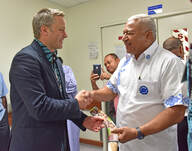 Assoc Prof Chris Hair, Pacific Programs Leader, with Mr Frank Bainimarama, Fiji Prime Minister, at the 2017 program
Assoc Prof Chris Hair, Pacific Programs Leader, with Mr Frank Bainimarama, Fiji Prime Minister, at the 2017 program
Over 2019 and 2020 ANZGITA will further develop the training of Dr Aminiasi Rokocakau of Fiji in ERCP procedures following his fellowship at Royal Melbourne Hospital (RMH) in 2018 where his training was initiated. This will be a purely voluntary exercise accomplished due to the dedication of a team of trainers supported by generous industry partners.
The training will be done at Dr Rokocakau’s workplace – the Colonial War Memorial Hospital (CWMH) in Suva. Teams formed from experienced ERCPists (currently including 6 from Australia and New Zealand) and nurses will volunteer their time to provide the training. One of the teams will visit Dr Rokocakau monthly for a 3-day period leading him in the further development of his skills. A nurse experienced in supporting ERCP procedures will go on most visits to assist and provide skills training to CWMH nurses.
The Fiji Ministry of Health and CWMH administration and medical management have endorsed the program and are working with Dr Rokocakau to ready the necessary facilities and support services at CWMH. The Australian Government through its PIP program, which is administered by RACS, will cover the expenses incurred by the volunteer clinicians who are providing their services pro bono. ANZGITA has used donated funds to purchase two latest-release Fujifilm duodenoscopes from CR Kennedy at a discounted price negotiated on our behalf with Fujifilm.
Equipment reprocessing, accessories and other needs are being supported by Montserrat Day Hospitals, Cantel Australia, Whiteley Corporation and CK Surgitech who have all donated equipment, materials or services towards the program. We are currently in discussions with other major suppliers for further donations-in-kind.
The training will be done at Dr Rokocakau’s workplace – the Colonial War Memorial Hospital (CWMH) in Suva. Teams formed from experienced ERCPists (currently including 6 from Australia and New Zealand) and nurses will volunteer their time to provide the training. One of the teams will visit Dr Rokocakau monthly for a 3-day period leading him in the further development of his skills. A nurse experienced in supporting ERCP procedures will go on most visits to assist and provide skills training to CWMH nurses.
The Fiji Ministry of Health and CWMH administration and medical management have endorsed the program and are working with Dr Rokocakau to ready the necessary facilities and support services at CWMH. The Australian Government through its PIP program, which is administered by RACS, will cover the expenses incurred by the volunteer clinicians who are providing their services pro bono. ANZGITA has used donated funds to purchase two latest-release Fujifilm duodenoscopes from CR Kennedy at a discounted price negotiated on our behalf with Fujifilm.
Equipment reprocessing, accessories and other needs are being supported by Montserrat Day Hospitals, Cantel Australia, Whiteley Corporation and CK Surgitech who have all donated equipment, materials or services towards the program. We are currently in discussions with other major suppliers for further donations-in-kind.
World Gastroenterology Organisation (WGO) Research Projects
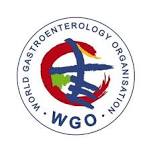
We are currently working with the WGO on three CWMH Fiji research projects which it is funding: 1) the implementation of an endoscopy reporting system to gather research and operational data (see below), 2) helicobacter pylori antibiotic resistance testing and 3) ATP monitoring of endoscope cleaning & disinfection. Read more about the projects here.
The WGO sees the Endoscopy Reporting Project as having the ability to assist in enhancement of patient safety and quality of care, improvement of personal and institutional audit and strengthening of training and accreditation of new gastroenterologists and research programs. The hope is that it will form a template for similar implementations in other WGO training centres especially in low resource countries.
The WGO sees the Endoscopy Reporting Project as having the ability to assist in enhancement of patient safety and quality of care, improvement of personal and institutional audit and strengthening of training and accreditation of new gastroenterologists and research programs. The hope is that it will form a template for similar implementations in other WGO training centres especially in low resource countries.

Provation has generously supplied their software product licences at no cost to the project. ANZGITA volunteers, who have considerable product experience from Queensland Health installations, have assembled and configured the system which has now been shipped to CWMH. Due to COVID, their further assistance with commissioning and the user training will need to be done remotely during December.
Previous Programs
There were two short reports by doctors on their involvement in the 2015 program that provide an interesting insight. The newsletter of the New Zealand Society of Gastroenterology (NZSG) has a note (page 3) by Martin Schlup on his two week involvement in the program. The RACP News has a note (article extracted) by Greg Lockrey. (Thanks to RACP and NZSG for permission to republish.)

